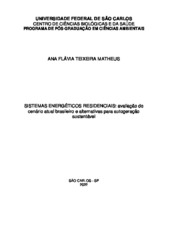| dc.contributor.author | Matheus, Ana Flávia Teixeira | |
| dc.date.accessioned | 2022-02-22T10:55:26Z | |
| dc.date.available | 2022-02-22T10:55:26Z | |
| dc.date.issued | 2022-02-04 | |
| dc.identifier.citation | MATHEUS, Ana Flávia Teixeira. Sistemas energéticos residenciais: avaliação do cenário atual brasileiro e alternativas para autogeração sustentável. 2022. Dissertação (Mestrado em Ciências Ambientais) – Universidade Federal de São Carlos, São Carlos, 2022. Disponível em: https://repositorio.ufscar.br/handle/ufscar/15625. | * |
| dc.identifier.uri | https://repositorio.ufscar.br/handle/ufscar/15625 | |
| dc.description.abstract | From the analysis of the current landscape of the country's residential energy systems and estimates of the potential for self-production of Brazilian residences, this work proposed solutions for environmental and energy security issues in the country. This dissertation is divided into four chapters, the first being introductory, the second consisting of a literature review - which goes through the concepts of energy planning, incentive programs and legislation on the subject, distributed generation and the technologies available for the self-production of residential energy - the third, an article - in which estimates of theoretical potentials for energy use in the Brazilian residential sector are made - and finally, the fourth chapter of final considerations. Photovoltaic electricity self-production combined - or not- with solar water heating systems in Brazilian houses have a potential for reducing 7% of national electric consumption, while the use of biogas for domestic cooking without collecting domestic sewage can reduce by 4% consumption of Brazilian GLP and resolve sanitation issues for up to 32% of the population. The research is therefore in the theme of energy sustainability and represents an initial effort to draw attention to the possibility of energy re-planning from residential self-production, pointing out possible paths for the public power to foster, with incentives and investments, significant solutions for energy and environment sectors. In the end, some reflections about the contributions and limitations of the work raise questions that can be continued and deepened by future research. | eng |
| dc.description.sponsorship | Não recebi financiamento | por |
| dc.language.iso | por | por |
| dc.publisher | Universidade Federal de São Carlos | por |
| dc.rights | Attribution-NonCommercial-NoDerivs 3.0 Brazil | * |
| dc.rights.uri | http://creativecommons.org/licenses/by-nc-nd/3.0/br/ | * |
| dc.subject | Geração distribuída | por |
| dc.subject | Energia solar | por |
| dc.subject | Biodigestor | por |
| dc.subject | Sustentabilidade energética residencial | por |
| dc.subject | Planejamento energético | por |
| dc.subject | Planejamento territorial | por |
| dc.subject | Distributed Generation | eng |
| dc.subject | Solar Energy | eng |
| dc.subject | Biodigester | eng |
| dc.subject | Residential energy sustainability | eng |
| dc.subject | Energy planning | eng |
| dc.subject | Territorial planning. | eng |
| dc.title | Sistemas energéticos residenciais: avaliação do cenário atual brasileiro e alternativas para autogeração sustentável | por |
| dc.title.alternative | Residential energy systems: assessment of the current Brazilian scenario and alternatives for sustainable self-generation | eng |
| dc.type | Dissertação | por |
| dc.contributor.advisor1 | Dupas, Francisco Antonio | |
| dc.contributor.advisor1Lattes | http://lattes.cnpq.br/5421344818132855 | por |
| dc.description.resumo | A partir da análise do panorama atual dos sistemas energéticos residenciais do país e estimativas do potencial de autoprodução das residências brasileiras, esse trabalho propões soluções para questões de âmbito ambiental e de segurança energética no país. Essa dissertação se divide em quatro capítulos, sendo o primeiro introdutório, o segundo composto por uma revisão da literatura - que passa pelos conceitos de planejamento energético, programas de incentivo e da legislação acerca do tema, geração distribuída e das tecnologias disponíveis para a autoprodução de energia residencial- o terceiro, um artigo – em que são feitas estimativas de potenciais teóricos de aproveitamento energético do setor residencial brasileiro – e por fim, o quarto capítulo de considerações finais. A autoprodução fotovoltaica de eletricidade combinada – ou não- com sistemas de aquecimento solar nas casas brasileiras possuem potencial de redução de 7% do consumo elétrico nacional, enquanto a utilização do biogás para cocção em residências sem coleta de esgoto doméstico pode reduzir em 4% o consumo de GLP brasileiro e resolver questões de saneamento para até 32% da população. A pesquisa se insere, portanto, na temática da sustentabilidade energética e representa um esforço inicial em chamar atenção para a possibilidade de replanejamento energético a partir da autoprodução residencial, apontando caminhos possíveis para o Poder Público fomentar, com incentivos e investimentos, soluções significativas para os setores de energia e meio ambiente. Ao final, algumas reflexões acerca das contribuições e limitações do trabalho erguem questões que podem ser continuadas e aprofundadas por pesquisas futuras. | por |
| dc.publisher.initials | UFSCar | por |
| dc.publisher.program | Programa de Pós-Graduação em Ciências Ambientais - PPGCAm | por |
| dc.subject.cnpq | CIENCIAS BIOLOGICAS::ECOLOGIA | por |
| dc.subject.cnpq | CIENCIAS BIOLOGICAS | por |
| dc.subject.cnpq | CIENCIAS HUMANAS::GEOGRAFIA | por |
| dc.subject.cnpq | CIENCIAS SOCIAIS APLICADAS::PLANEJAMENTO URBANO E REGIONAL | por |
| dc.subject.cnpq | ENGENHARIAS | por |
| dc.subject.cnpq | CIENCIAS SOCIAIS APLICADAS::PLANEJAMENTO URBANO E REGIONAL::SERVICOS URBANOS E REGIONAIS | por |
| dc.subject.cnpq | ENGENHARIAS::ENGENHARIA SANITARIA::SANEAMENTO AMBIENTAL::ECOLOGIA APLICADA A ENGENHARIA SANITARIA | por |
| dc.subject.cnpq | ENGENHARIAS::ENGENHARIA SANITARIA::SANEAMENTO BASICO::RESIDUOS SOLIDOS, DOMESTICOS E INDUSTRIAIS | por |
| dc.publisher.address | Câmpus São Carlos | por |
| dc.contributor.authorlattes | http://lattes.cnpq.br/7870211795396883 | por |


